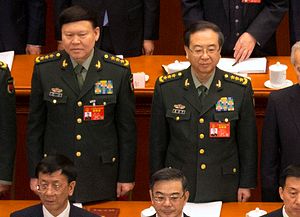A top Chinese military general has killed himself amid a probe into military corruption, Chinese state media reported on November 28. General Zhang Yang apparently hanged himself while being held under house arrest, pending an investigation on corruption charges.
Zhang’s death puts to focus Xi Jinping’s quest for total control over China’s military, the People’s Liberation Army (PLA). It is a viseral reminder of the high stakes at the top of Chinese politics and the Xi’s ongoing purging of the military.
Zhang had been a member of the powerful Central Military Commission (CMC), which controls China’s armed forces. As the head of the CMC Political Work Department, he was responsible for ensuring the political reliability of the PLA through ideological indoctrination and propaganda.
He disappeared from the public view in September along with another CMC member, General Fang Fenghui, a rising star who headed the CMC Joint Staff Department. It was clear that both had been purged when their names were left off the PLA delegation list for the 19th Chinese Communist Party Congress, attendance of which is prerequisite for involvement in elite politics and high office.
Suicides by top Chinese leaders are extremely rare in post-Mao China. “Evading the punishment of Party discipline and law by committing suicide was disgusting conduct,” a PLA Daily commentary stated. The commentary made clear that Zhang was investigated for his links with Guo Boxiong and Xu Caihou, both former CMC vice chairs purged by Xi. It added: “a lot still needs to be done in eliminating the pernicious influence of Guo and Xu… as well as in the fight against corruption.”
Since coming to power in 2012, Xi has purged more than 100 high-level military officers, and the PLA has investigated 4,000 cases, resulting in disciplinary actions against 13,000 officers. The death of Zhang will further intimidate the PLA establishment, and it is unlikely to dampen Xi’s anti-corruption effort within the military. The inclusion of Zhang Shengmin, the head of CMC Commission for Discipline Inspection, on the post-19th Party Congress CMC itself is a clear indication of Xi’s intent to maintain, if not intensify, the campaign against his opponents in the PLA.
Besides purging his opponents, Xi has consolidated military power by promoting a new generation of military leaders and installing allies in key positions. In 2017 alone, leaders of the most of PLA’s organizations have been changed, including all four service heads (Army, Navy, Air Force, and Rocket Force), three of the five theater commanders (Southern, Northern, and Central), and nine of the CMC’s 15 functional organs. Further, the PLA delegation to the 19th Party Congress had a staggering 87 percent first-timers, representing the rise of a new generation of PLA leaders.
In addition to controlling personnel, Xi has centralized military authority through reinforcing the “CMC Chairman Responsibility System.” Under this system, Xi seeks to exercise absolute power over the military. This differs from the the experience of his predecessors Hu Jintao and Jiang Zemin, both of whom shared military power with their CMC vice chairs and were not involved in the day-to-day affairs of the PLA.
Another measure that Xi adopted was to downsize the CMC from 11 to eight members, which has the effect of further consolidating Xi’s control of the military, especially since he was able to stack the new CMC with his allies.
Without a doubt, Xi has taken very seriously Mao’s famous adage “political power grows out of the barrel of a gun.”
Adam Ni is a researcher at the Strategic and Defence Studies Centre, Australian National University. His main areas of interest include China’s foreign and security policy. His current work focuses on the modernization of China’s armed forces. Follow Adam on Twitter @adam_ni.

































